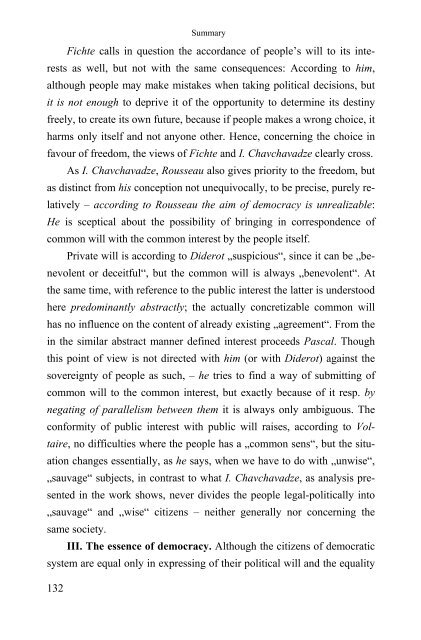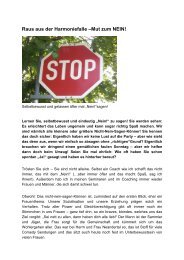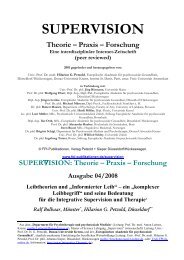Ilia Chavchavadze - brainGuide
Ilia Chavchavadze - brainGuide
Ilia Chavchavadze - brainGuide
You also want an ePaper? Increase the reach of your titles
YUMPU automatically turns print PDFs into web optimized ePapers that Google loves.
Summary<br />
Fichte calls in question the accordance of people’s will to its inte-<br />
rests as well, but not with the same consequences: According to him,<br />
although people may make mistakes when taking political decisions, but<br />
it is not enough to deprive it of the opportunity to determine its destiny<br />
freely, to create its own future, because if people makes a wrong choice, it<br />
harms only itself and not anyone other. Hence, concerning the choice in<br />
favour of freedom, the views of Fichte and I. <strong>Chavchavadze</strong> clearly cross.<br />
As I. <strong>Chavchavadze</strong>, Rousseau also gives priority to the freedom, but<br />
as distinct from his conception not unequivocally, to be precise, purely relatively<br />
– according to Rousseau the aim of democracy is unrealizable:<br />
He is sceptical about the possibility of bringing in correspondence of<br />
common will with the common interest by the people itself.<br />
Private will is according to Diderot „suspicious“, since it can be „benevolent<br />
or deceitful“, but the common will is always „benevolent“. At<br />
the same time, with reference to the public interest the latter is understood<br />
here predominantly abstractly; the actually concretizable common will<br />
has no influence on the content of already existing „agreement“. From the<br />
in the similar abstract manner defined interest proceeds Pascal. Though<br />
this point of view is not directed with him (or with Diderot) against the<br />
sovereignty of people as such, – he tries to find a way of submitting of<br />
common will to the common interest, but exactly because of it resp. by<br />
negating of parallelism between them it is always only ambiguous. The<br />
conformity of public interest with public will raises, according to Voltaire,<br />
no difficulties where the people has a „common sens“, but the situation<br />
changes essentially, as he says, when we have to do with „unwise“,<br />
„sauvage“ subjects, in contrast to what I. <strong>Chavchavadze</strong>, as analysis presented<br />
in the work shows, never divides the people legal-politically into<br />
„sauvage“ and „wise“ citizens – neither generally nor concerning the<br />
same society.<br />
III. The essence of democracy. Although the citizens of democratic<br />
system are equal only in expressing of their political will and the equality<br />
132
















